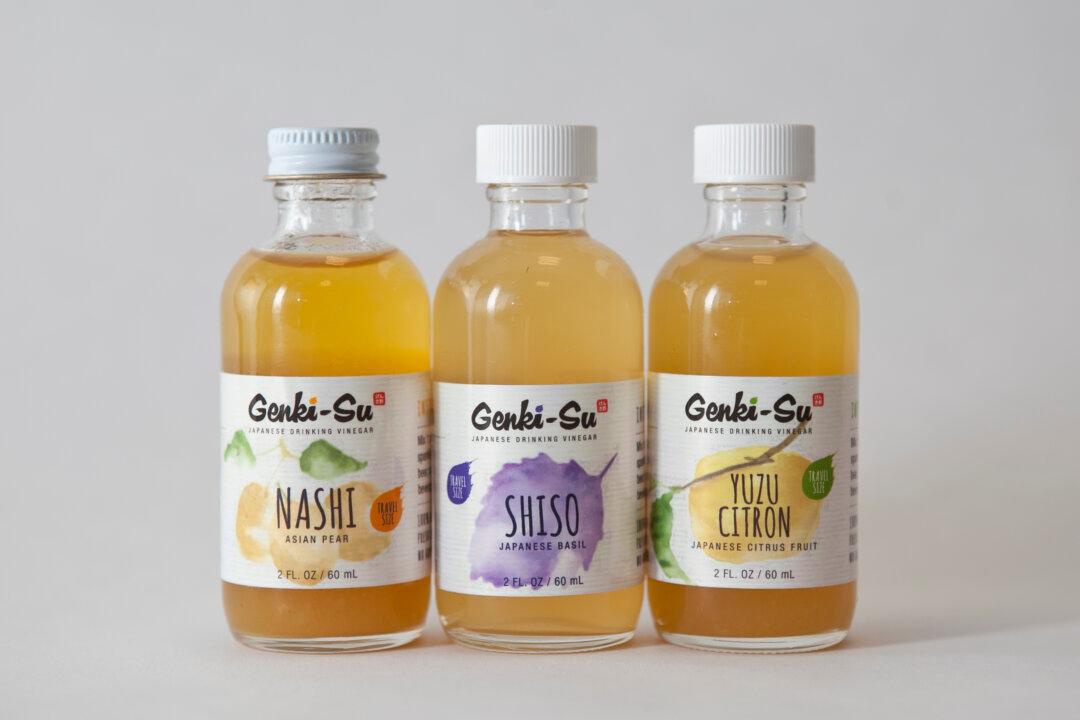What did samurai warriors do when they felt tired during battles? They drank vinegar.
Drinking mild, fruit-infused vinegar is an ancient Japanese practice and is a healthy way to boost energy and aid weight loss. These vinegars are flavored with fruit and contain half the acidity of cooking vinegar.
As a child, drinking vinegar was a key part of Takako Shinjo’s daily diet in Okinawa, Japan. Her mother would make it fresh, adding seasonal fruits and other natural ingredients she gathered from her garden.
When Shinjo moved to the United States, she found that the drinking vinegar for sale here was too sweet or artificial, so she started making her own.
Her experimentation led to the creation of an all-natural Japanese drinking-vinegar line, Genki-Su, which she founded with partner Judy Tan in 2012.
Genki-Su means “energy vinegar” in Japanese. The vinegars use all-natural ingredients and are built upon the recipes of Shinjo’s mother.
Health Benefits
You can consume drinking vinegar by stirring several teaspoons into sparkling water, tea, fresh juice, a smoothie, or yogurt. For those with adventurous taste buds, you can use Genki-Su as a cocktail mixer.
The Genki-Su line currently has four distinct flavors of drinking vinegar: shiso (a Japanese herb in the mint family), citrus, pear, and ginger.
The shiso drinking vinegar is made with coconut vinegar, honey, stevia, and shiso. Shiso has a particularly refreshing taste, with subtle hints of mint and basil. There is also a light, sweet aftertaste that the other flavors do not have.
Shiso is rich in antioxidants and has anti-inflammatory and anti-allergenic properties. It is also good for the skin and immune system, and shiso’s essential oils contain high levels of omega-3 fatty acid.
Genki-Su gets its shiso leaves from California farms and steeps them within two days, according to its website.
The citrus drinking vinegar also tastes surprisingly sweet and not too acidic as one might expect from combining citrus fruits and vinegar. It makes water taste like juice.
It is made with coconut vinegar, honey, stevia, and the East Asian citrus fruits yuzu and kumquat.
Yuzu contains vitamin P, which balances with vitamin C to promote healthy blood circulation. It is good for muscle pain and digestion.
The pear drinking vinegar was the favorite of several Epoch Times staff who tasted the vinegars. The pear flavor is a nice complement to herbal tea. This flavor has bartlett pears, anjou pears, fuiji apples, honey, stevia, and nashi, which is also called Asian pear and is a cross between an apple and a pear.
The pear vinegar has a hint of sweetness with the delightful flavor of real pears. For dieters, it has the bonus of leaving the drinker feeling satisfied, unlike sugary drinks that make you want to drink more. The pear vinegar can prove helpful for dieting.
It is also a good source of vitamin B2 and potassium. It contains 80 percent of the minimum daily vitamin C requirement.
Genki-Su comes as a concentrate. Each 12-ounce bottle equals 24 servings. Each bottle costs $16.99 individually. A set of three bottles costs $50.97. The products can be purchased online.





